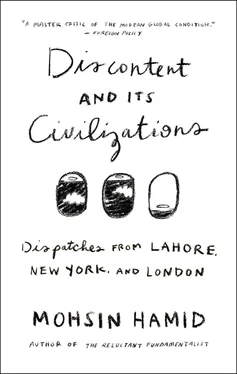Lieven’s is a vital book, with much wisdom in its advice for the West. But equally important, this detailed and nuanced survey offers Pakistanis a mirror in which to look hard at their country and themselves. Pakistan’s resilience is bound up with its resistance to reform, yet reform will be essential for facing the great challenges ahead, including the potentially devastating impacts of climate change on a dry and overpopulated land that is dependent on a single river and its tributaries. Pakistanis, and above all members of Pakistan’s military, would do well finally to reject their country’s disastrous embrace of militants. Pakistan must urgently mend its relationships in its own neighborhood and refocus on taking care of itself. Time is not on its side.
(2011)
Nationalism Should Retire at Sixty-Five
MY HOME COUNTRY, Pakistan, was born sixty-five years ago today. Next door, India reaches that milestone tomorrow. We’re in crowded company, anniversary-wise: three-quarters of Asia’s 4.2 billion people live in states that became independent or free of occupation around the same time, nations now in their sixties.
I would like to report that an aura of enlightened wisdom suffuses countries in their seventh decade. But, glancing around Asia, the years on either side of age sixty-five seem to bring instead an unfortunate obsession with national supremacy.
Pakistan, for example, is meddling in the affairs of neighbors, victimizing marginalized ethnic and religious groups, and building nuclear weapons while citizens go without electricity. India is doing the same. China is flexing its muscles along its frontiers, North and South Korea are growling at each other, and so are Iran and Saudi Arabia. Continent-wide, military spending is ratcheting upward.
Asian economies are approaching and surpassing in size those of Europe and North America. So it’s worth asking whether Asian states also hope to approach and surpass in horror the nationalistic miscalculations of Europe and North America, mistakes that made much of the twentieth century a blood-drenched global battleground?
Many say that the twenty-first century will be the Asian century, that Asia will become central to the world economy and to global geopolitics. But for us Asians, the Asian century is also likely to bring a great dryness. Monsoon rains will become unpredictable and aquifers will drop, as is already happening in India and Pakistan. These changes could in turn unleash famines and provoke deadly conflicts over disputed rivers and watersheds, especially those of the Himalayas.
And the Asian century is likely to bring a great wetness. Sea levels will rise and low-lying land will be inundated, as is already happening in the Maldives. Billions of Asians live in coastal areas. The displacement of large numbers of them, on the strip between Chennai and Yangon, say, or between Singapore and Shanghai, could trigger movements of people so gargantuan as to be unprecedented in history.
The Asian century is also likely to bring a great aging, a great inequality, a great slum expansion. It is likely to bring challenges too big for any one of our countries, even the biggest, to tackle humanely alone.
It may, therefore, be time for us to recognize that aggressively thumping one’s sexagenarian chest is a sign not of virility but of willful self-delusion. At sixty-five we would be better off thinking of retirement. Maybe not yet of our nations, for first we will have to develop a good alternative, but at least of our prickly nationalisms.
We need to begin to dismantle the chauvinisms we have built (partly as inoculations against the shame of our colonial experiences), and think about a morality that is bigger than Pakistan or India or even China — a morality that dares to be at least Asian in scale, and having achieved that, is ready to progress to something even larger, to the scale of humanity.
How might this be achieved? A change in rhetoric would be helpful. Instead of a relentless focus on the divided interests of our nations, the incessant drum beating of national propaganda, and the dice throwing of great games, we could begin to speak of an Asian interest, and a human interest, that is the opposite of zero sum.
We could commit to a blurring and reconceiving of national boundaries, to the immediate benefit of frontier-split communities, and to the growing benefit of everyone else. We might, as a start, embrace cross-border autonomous zones, visa-free travel, an Asian highway and railway network, and a reduction of legal differences between citizens and resident noncitizens.
And we could concern ourselves with a restoration of legitimacy at the global center, where the United Nations stands discredited. Instead of agitating for seats on the Security Council, we might push for its abolition, and for the creation in its place of a new, universal lower house with representation based on population.
The US and EU, despite the internal victories they have won for democracy and the rule of law, are stumbling on the world stage. Perhaps this is in part because their models are attempts at uber-nations, not at a post-national collective humanity. Such models are too small-minded for the challenges the globe faces, thrown off-balance by the conflicted ambition of mating individual equality with national superiority.
An advantage of wearing the hat of the largest continent is that, when imagining a system, you don’t necessarily have to take as a starting point that preserving the advantage of the few against the many is in your own best interest. Asia is big enough to dream of a world where people are judged not by the color of their passport, but by the content of their character.
Our continent may still be a mess, but it is a mess with incredible potential. I say this from a room in a country that is messier than most, as my electricity supply cuts off every other hour, as my tap water remains unfit to drink, as foreign drones strike and local nuclear scientists toil, and as a group of boys who should be in school wander down my street, kicking what looks like a rusted can.
I hope for happier birthdays. For Pakistan, for Asia, for us all.
(2012)
To Fight India, We Fought Ourselves
ON MONDAY, my mother’s and sister’s eye doctor was assassinated. He was a Shia. He was shot six times while driving to drop his son off at school. His son, age twelve, was executed with a single shot to the head.
Tuesday, I attended a protest in front of the Governor’s House in Lahore demanding that more be done to protect Pakistan’s Shias from sectarian extremists. These extremists are responsible for increasingly frequent attacks, including bombings this year that killed more than two hundred people, most of them Hazara Shia, in the city of Quetta.
As I stood in the anguished crowd in Lahore, similar protests were being held throughout Pakistan. Roads were shut. Demonstrators blocked access to airports. My father was trapped in one for the evening, yet he said most of his fellow travelers bore the delay without anger. They sympathized with the protesters’ objectives.
Minority persecution is a common notion around the world, bringing to mind the treatment of African Americans in the United States, for example, or Arab immigrants in Europe. In Pakistan, though, the situation is more unusual: those persecuted as minorities collectively constitute a vast majority.
A filmmaker I know who has relatives in the Ahmadi sect told me that her family’s graves in Lahore had been defaced, because Ahmadis are regarded as apostates. A Baloch friend said it was difficult to take Punjabi visitors with him to Balochistan, because there is so much local anger there and violence toward the Baloch. An acquaintance of mine, a Pakistani Hindu, once got angry when I answered the question “how are things?” with the word “fine”—because things so obviously aren’t. And Pakistani Christians have borne the brunt of arrests under the country’s blasphemy law; a governor of my province was assassinated for trying to repeal it.
Читать дальше












